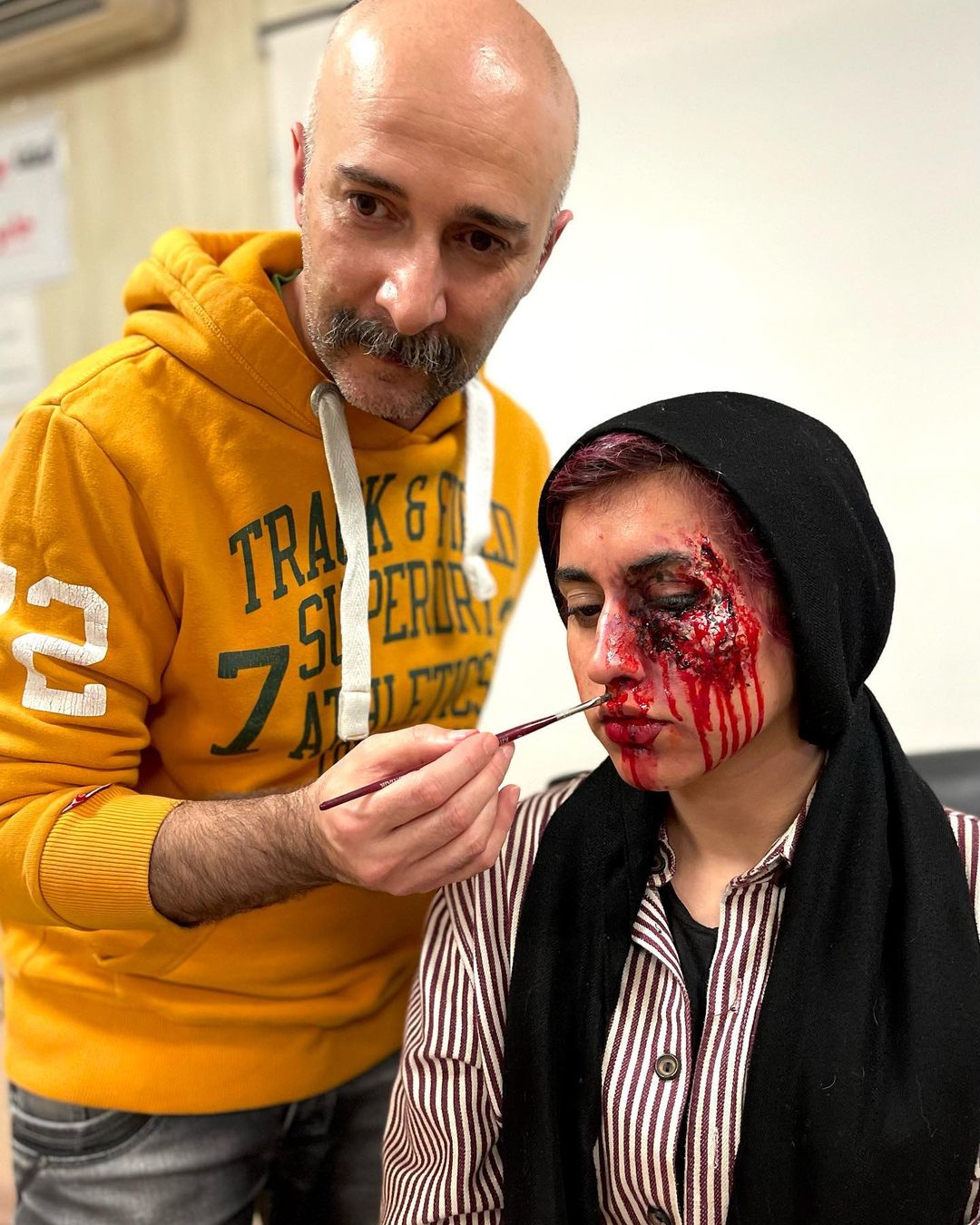BABAK MOAYERIAN
Biography
Babak Moarian was born on 7/7/1353 (September 29, 1974) in the city of Tehran. From a young age, Babak was greatly influenced by his father, Jalaluddin Moarian, who was deeply involved in face painting and the cinematic arts. Spending his childhood immersed in the world of colors, brushes, and cinematic tools, Babak developed a passion for the art of face painting. This passion was evident from his early years when he would often engage in face painting games with his friends, preferring this creative pursuit over other typical childhood activities. His desire to become a successful face painter grew stronger, and he frequently accompanied his father on various film projects, gaining hands-on experience as an apprentice.
As Babak entered high school, he stumbled upon the boys' visualization art school by chance, which led him to change his major to graphics. This decision marked the beginning of his formal education in the arts. During his time in art school, Babak honed his skills in the principles and basics of art. He later continued his education at the university level, where he focused on learning painting under the supervision of experienced professors. Babak successfully completed his university studies, culminating in an academic project that explored the impact of painting on face painting for the first time.
After graduating from university, Babak embarked on a professional career as a makeup consultant and performer, often working alongside his father on various serials and movies. It was during this period that he met and married his wife, who was also his university colleague. Together, they made significant contributions to the cinematic industry, and their home became a hub of artistic collaboration. Babak and his wife were highly sought after for their expertise, leading to numerous opportunities to work on episodes and serials together.
One of Babak's notable achievements was his collaboration with MBC in Syria, where he was invited to participate in a historical series project. The success of this project opened doors for Babak in other neighboring countries, and he was soon invited to work as a designer and presenter. His career took him to Kuwait, where he worked for eight years on various projects for MBC and Al-Rai Wal-Watan channels. Unfortunately, the diplomatic relations between Kuwait and Iran became strained, forcing Babak to end his professional engagement in Kuwait.
Upon returning to Iran, Babak continued to work on two different projects despite facing significant challenges due to the limitations imposed on Iran's television and cinema industry. However, these challenges did not deter him. With his vast experience and the knowledge he gained as a director, Babak became an even more effective instructor and teacher in his field. He contributed significantly to the Makeup Training Center under the supervision of the Ministry of Education, where he trained numerous students. His students, who came from both Iran and other parts of the world, were highly successful, with many going on to uplift the field of academic makeup on an international scale.
Throughout his career, Babak worked on various cinema and TV projects, including:
- Chun Abar Dar Baharan directed by Amir Soleimani (1368)
- Pickpockets Do Not Go to Heaven directed by Abolhassan Davoodi (1370)
- Shaghayegh directed by Mr. Qarizadeh (1370)
- Prison of Deo directed by Mohammad Mohammadzadeh (1371)
- Hatem Kia (1376)
- Shokran directed by Behrouz Afkhami (1377)
- Delbakhte directed by Khosro Masoumi (1378)
- Tarzan and Tarzan directed by Abdul Alizadeh (1380)
- Thirteen Cats on a Hot Roof directed by Abdul Alizadeh (1381)
- Ziggurat Goddess directed by Rahman Rezaei (1382)
- This Is Not a Romantic Song directed by Rahman Rezaei (1383)
- Brighter Than Silence directed by Hassan Fathi (1378-1380)
- The Tenth Night Series directed by Hassan Fathi (1383)
- Ghareeb Paedeh Series directed by Javad Shamqadari (2001)
- Armaghan Taraki Series directed by Jalil Saman (2009)
- Parvaneh Series directed by Jalil Saman (2011)
Babak's international work includes collaborations on the following serials outside of Iran:
- Al Zahir Baybars for Syria (2005)
- Serial Shababik for Al-Rai Kuwait (2006)
- Kani and Mani for Al-Watan Kuwait (2007)
- Al-Fatin for Al-Rai Kuwait (2008)
- Al-Tandeel for Al-Funun Kuwait (2008)
- Dendrama for Al-Watan Kuwait (2008)
- Hadameh for Al-Watan Kuwait (2009)
- Amarco for Al-Watan Kuwait (2009)
- Anin for Al-Watan Kuwait (2010)
- Wi-Fi Series for MBC Network (2012)
Babak Moarian's contributions to the cinematic arts have been vast and impactful. His dedication to his craft, both as an artist and an educator, has left an indelible mark on the industry, not only in Iran but also on an international level. His efforts in training the next generation of artists have ensured that his legacy will continue to influence the world of cinematic makeup for years to come.

